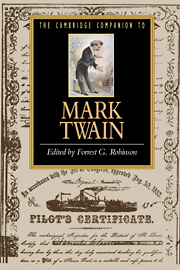Book contents
- Frontmatter
- 1 Mark Twain as an American Icon
- 2 The Innocent at Large
- 3 Mark Twain and Women
- 4 Mark Twain's Civil War
- 5 Banned in Concord
- 6 Black Critics and Mark Twain
- 7 Mr. Clemens and Jim Crow
- 8 Speech Acts and Social Action
- 9 How the Boss Played the Game
- 10 Mark Twain's Travels in the Racial Occult
- 11 Mark Twain's Theology
- Further Reading
- Index
- Continued Series List
6 - Black Critics and Mark Twain
Published online by Cambridge University Press: 28 May 2006
- Frontmatter
- 1 Mark Twain as an American Icon
- 2 The Innocent at Large
- 3 Mark Twain and Women
- 4 Mark Twain's Civil War
- 5 Banned in Concord
- 6 Black Critics and Mark Twain
- 7 Mr. Clemens and Jim Crow
- 8 Speech Acts and Social Action
- 9 How the Boss Played the Game
- 10 Mark Twain's Travels in the Racial Occult
- 11 Mark Twain's Theology
- Further Reading
- Index
- Continued Series List
Summary
The title of this essay raises a vexing set of questions: What justifies the racial categorization of critical opinion? Do all black critics share a critical consensus on Twain, or at least a range of opinions, that distinguishes them from other critics: “white” critics, “brown” critics, and so on? If so, how is it that race constitutes the basis for a critical consensus; and if it does not, what is the point of surveying critical perspectives on the basis of race? Are there not some white critics who agree with some black critics; and if so, should they not be included in the discussion? The effect of treating black critics as a group separate from other critics is to segregate them from the majority of critics and criticism concerned with Mark Twain. However instructive it may be to regard such critics as a separate group, the troubling implications of segregation remain.
This being the case, is there anything, apart from social convention, that justifies the topic "black critics and Mark Twain"? Perhaps not. Such a question can always be qualified, however, by the criteria that define justification. In ideal terms, race ought not matter as a way of categorizing critical literature. Unfortunately, social conventions cannot be dismissed simply because they are intellectually spurious. In criticism, as well as in every other aspect of American life, our perceptions and attitudes are indelibly race-coded. Conceptually, racial categories make no sense, but in actual experience, race continues to be definitive. Regrettably, race continues to matter.
- Type
- Chapter
- Information
- The Cambridge Companion to Mark Twain , pp. 116 - 128Publisher: Cambridge University PressPrint publication year: 1995
- 2
- Cited by

